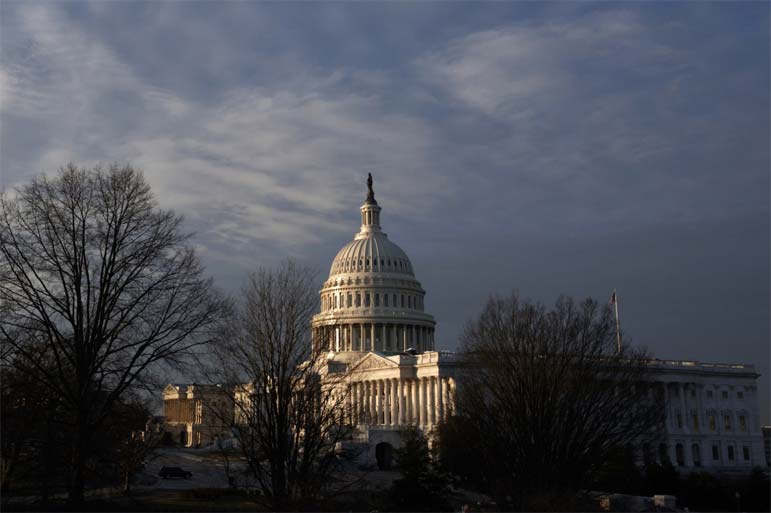
The sweeping liberal ideas backed by many of the party's candidates - Medicare for all, a "Green New Deal," and a $15 federal minimum wage - would struggle to get past a Senate where Republicans are likely to retain powerful influence over what legislation becomes law, even if a Democrat defeats President Donald Trump and takes office in January 2021.
Some Democrats are sounding warnings about the expectations being raised among the progressive voting base that helped the party gain control of the House and who'll be crucial to any chances of winning the White House.
"The Senate is going to make or break the progressive agenda in 2021, regardless of how well we do at the top of the ticket," said Adam Jentleson, a former spokesman for Sen. Harry Reid of Nevada.
The problem is math and congressional procedure. In the best case scenario for Democrats -- another wave election that consolidates the party's hold on the House and wins them a majority in the Senate -- any far-reaching changes still would struggle to get 50 votes in the Senate, let alone the 60 votes needed to advance most legislation.
Democrats would need to gain a minimum of three Senate seats to have a majority. But even then, the chamber's structure allows for a minority to block most legislation unless the filibuster is eliminated, a step that many Senate Democrats say they're unwilling to take.
The electoral map gives Democrats some Senate pickup opportunities, but none will be easy.
Just two GOP senators face re-election in states won by Hillary Clinton in 2016: Colorado's Cory Gardner and Maine's Susan Collins. From there it gets tougher. Arizona's Martha McSally and Georgia's David Perdue are on the ballot in once solidly Republican states where Democrats have been making gains. North Carolina's Thom Tillis and Iowa's Joni Ernst represent swing states where Democrats have struggled in recent years. Given the results from the 2018 election, Texas's John Cornyn is seen as a long-shot target for Democrats.
At the same time, Democratic Senator Doug Jones will face a very difficult re-election in deep-red Alabama.
"The absolute best case scenario for Democrats is a Senate majority somewhere in the low 50s," Jentleson said, adding that getting to 52 Democratic seats would effectively require a political "tsunami."
Such a 52-seat majority would include figures like West Virginia's Joe Manchin, Arizona's Kyrsten Sinema and Montana's Jon Tester, all of whom represent Republican-leaning states and have kept their distance from the most progressive proposals in the party. None support Medicare for all or the Green New Deal, and getting their votes would be a heavy lift.
Even now, some of the most ambitious proposals from progressives such as the Green New Deal have gotten a tepid response from Democratic leaders, including House Speaker Nancy Pelosi and the second-ranking Senate Democrat, Dick Durbin of Illinois.
Democrats were hamstrung by the filibuster in President Barack Obama's first two years, even when they had 57 to 60 active senators, a number that fluctuated because of contested elections, illnesses and deaths. That was due to Senate GOP leader Mitch McConnell's success in keeping Republicans unified against Obama's agenda.
"The Senate is always the dream-catcher for stopping the most partisan and ideologically far-reaching proposals out of the campaign," said Josh Holmes, a confidant and former top aide to McConnell. "What it does is protect the American people from wave elections one way or another" and "forces all legislation toward the middle."
Holmes said that whether McConnell is the leader of a GOP majority or a minority, the 60-vote threshold will prevent single-payer health insurance or a Green New Deal from becoming law.
"There will not be a socialized health care plan, nor will there be a restructuring of the American economy that necessitates crushing the entire energy infrastructure of the country," he said.
Some influential progressives are pushing Democrats to commit to end the filibuster, with its 60-vote threshold for legislation, to clear the way for their agenda.
"This field, with so many senators in it, knows full well that even in the fortunate scenario where we defeat Donald Trump and win back the Senate, Mitch McConnell will preserve a veto over the entire progressive agenda thanks to the filibuster," said Brian Fallon, a Democratic operative who worked for Hillary Clinton's 2016 campaign and for Senate Minority Leader Chuck Schumer.
"Any candidate campaigning on ambitious solutions but failing to call for eliminating the filibuster is not being honest about their ability to deliver change," Fallon said.
So far, most Democratic candidates are hesitant to go there. Massachusetts Sen. Elizabeth Warren recently told the progressive podcast Pod Save America that "all options are on the table" when asked about scrapping the filibuster in 2021, "if the Republicans are going to block us on key pieces that we're trying to move forward."
California Sen. Kamala Harris declined to take a position when asked by a voter in Ankeny, Iowa, on Saturday, saying that the question of scrapping the filibuster is a "difficult one and I actually am conflicted."
Vermont Sen. Bernie Sanders, who has perhaps the most far-reaching liberal agenda, told CBS This Morning this month that he's "not crazy about getting rid of the filibuster."
Fallon's pitch so far hasn't won over enough Democrats, with senators like Chris Coons of Delaware recently vowing on the Senate floor to never support ending the 60-vote threshold. Many Senate Democrats, including some running or considering running for president --Harris, Cory Booker, Sherrod Brown, Kirsten Gillibrand and Amy Klobuchar, signed a letter in 2017, led by Coons and Collins, urging McConnell to keep the filibuster intact for leg
islation. "There are ways of getting things through Congress with the legislative filibuster still in place," according to Brown of Ohio, who said he'll make an announcement on a 2020 run by the end of March. "It takes a chief executive who knows what she's doing, or knows what he's doing."
But Democratic Sen. Chris Murphy of Connecticut said that if Democrats take power, "we should be open to" changing the rules - which can be done with 51 votes.
Republican Sen. John Barrasso of Wyoming said there's "always a potential" for the next Democratic majority to get rid of the filibuster if the country elects a "liberal president who's taken this far left, hard left turn where the presidential candidates seem to be going." He said if that happens, Republicans won't be to blame.
Provided at least 50 Democrats in a new majority could stay united -- a big if -- they could pass much of their economic agenda through the tortured budget reconciliation process, which bypasses filibusters on budget-related items. Yet the failure of Republicans to repeal and replace the Affordable Care Act shows the difficulty of that route, which requires navigating a gantlet of byzantine rules.
A simple health care expansion and higher taxes for the wealthy would comply. But other items would be far harder to navigate through procedural hurdles, including items Democrats almost universally back such as a minimum wage increase, laws friendlier to forming unions, voting rights legislation and universal gun background checks.
Both parties have also become more ideologically cohesive and grown further apart, leaving little ground in the middle for the kind of big, bipartisan compromises of decades past. Republicans will have every incentive to thwart Democratic plans.
"We are facing obstacles that have been constructed with Republicans playing constitutional hardball," Jentleson said. "And Democrats are going to have to be playing hardball to get the change we want."
Every weekday JewishWorldReview.com publishes what many in the media and Washington consider "must-reading". Sign up for the daily JWR update. It's free. Just click here.
(COMMENT, BELOW)
Previously:
• 12/26/18 How the Left still intends to turn around 'Medicare for All' fantasy
• 12/11/18 Pelosi's top job in 2019: Referee fights between rival Dems, who could easily destroy their party
• 07/24/18 This House special election poses latest test of 'blue wave'
• 08/29/16 Hillary tries to separate Trump from Republicans, worrying some Dems
• 05/04/16 Ted Cruz's rise and fall is explained by a cruel paradox
• 04/27/16 Up next: Trump aims to prove critics wrong in foreign policy speech
• 02/24/16 Evidence of 'political revolution' in name only
• 01/19/16 Experts say Rubio's economic plan doesn't add up
• 01/06/16 What the 2016 presidential candidates must do to win
• 12/31/15 Six factors that could make a difference for Republicans in 2016
• 11/25/15 Bromance on the rocks: surging Cruz begins to poke Trump
• 09/23/15 Scott Walker's shocking exit: A tipping point in the Republican primary?
• 05/06/15 GOP-backed ObamaCare?


 Contact The Editor
Contact The Editor
 Articles By This Author
Articles By This Author